- The Bottom Line, Up Front:
- What Pilot Brings to the Table
- How Puzzle.io Approaches the Same Problem
- The Founder’s Dilemma: Service vs. System
- Pricing and Value Considerations
- Reporting and Visibility
- Integrations and Ecosystem Fit
- Audit Readiness and Compliance
- Who Each Platform Suits Best
- Long-Term Scalability
- User Experience: Interface and Workflow
- The Subtle Edge
- The Bottom Line
Last Updated on August 31, 2025 by Ewen Finser
Hey fellow bean counters! When clients who don’t want to book-keep ask me what tools they should use for bookkeeping, I usually steer the conversation to Pilot and Puzzle.io. Both are names you’ll hear if you spend time in the world of finance and they share a common goal: to make accounting less painful and more reliable for management. But after years of working with different systems and advising business owners, I’ve come to see some clear differences in how these platforms approach the problem that is modern business and financials.
The Bottom Line, Up Front:
Pilot and Puzzle.io both aim to simplify startup accounting, but they take very different approaches—Pilot offers a managed bookkeeping service, while Puzzle.io delivers a software-first platform. Pilot is best for founders who want to stay completely hands-off, but it can become costly and opaque as businesses grow. Puzzle.io emphasizes transparency, scalability, and real-time access to financial data, making it better suited for companies that want durable financial infrastructure and decision-making clarity. In my professional judgment as a CPA, Puzzle.io edges out Pilot as the stronger long-term solution.
What Pilot Brings to the Table
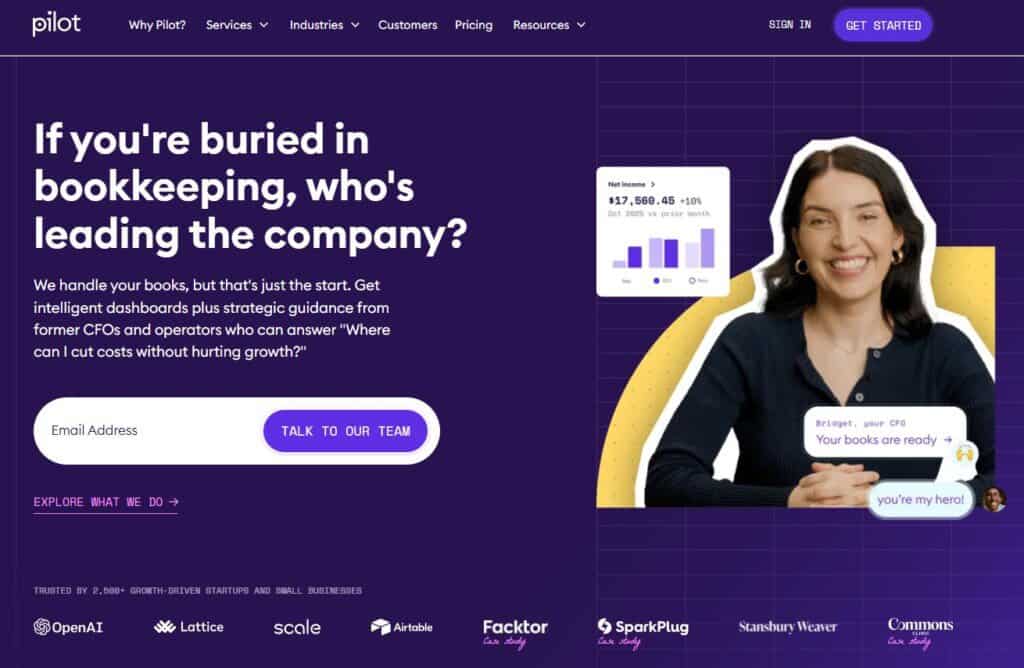
Pilot built its reputation on the idea that early-stage companies don’t want to think about bookkeeping (and they’re probably right). Their pitch is simple: outsource the books to Pilot, and they’ll pair you with a team of accountants who manage your ledgers behind the scenes.
In practice, Pilot feels less like software and more like a managed service. When I’ve seen clients on Pilot, they usually interact with the platform through scheduled updates, dashboards, and communication with their assigned finance team.
The benefits are pretty obvious:
- Hands-off bookkeeping – Founders don’t have to wrestle with QuickBooks or hire an in-house controller early on. They get to focus on running their business.
- Human accountants included – Pilot’s team reconciles accounts and prepares financials.
- Consistency – For straightforward businesses, monthly reports arrive on time and in a familiar format.
The drawback, though, is that you’re still very dependent on people rather than technology. That’s not necessarily bad as accounting will always need judgment but it can feel like you’re renting a bookkeeping team rather than investing in a scalable system. And in my experience, when you want custom insights or granular visibility, you’re often at the mercy of turnaround times.
How Puzzle.io Approaches the Same Problem
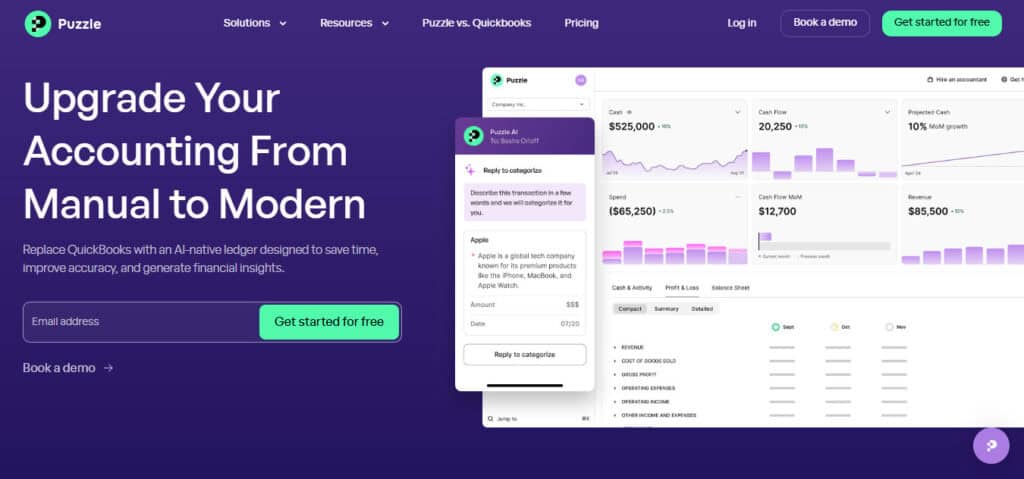
Puzzle is built differently. Instead of leading with people, it leads with the platform. The software pulls data directly from banks, payment processors, and accounting systems, then organizes it into financial statements that are both audit-ready and easy to explore.
From my seat, that makes a big difference. With Puzzle, the data is structured in a way that doesn’t just produce a P&L, it also gives you the building blocks for deeper analysis. I’ve been able to drill down into transaction-level detail without waiting on an outsourced bookkeeper to send me a spreadsheet.
The advantages Puzzle.io offers tend to stand out in three areas:
- Transparency – You can trace numbers back to the source without back-and-forth emails.
- Speed – Books close faster because the system automates reconciliations and categorization.
- Flexibility – Controllers, CFOs, or outside CPAs can log in and work directly with the data.
What Puzzle.io seems to understand is that founders need both accuracy and visibility, and it relies heavily on its AI to help deliver that. Puzzle delivers accuracy by building the rules and automation into the software itself. Pilot delivers accuracy by leaning on its team of accountants.
The Founder’s Dilemma: Service vs. System
When I advise business owners, I often frame this choice as service vs. system.
- Pilot = Service. You’re paying for people to keep your books clean.
- Puzzle.io = System. You’re adopting a platform that structures financial data for long-term use.

If you’re a founder who doesn’t want to think about finance at all, Pilot can work. But in the long run, most growing businesses need more than compliance bookkeeping. They need financial clarity: the ability to ask “What did we spend on marketing last quarter?” or “How does our cash runway change if payroll increases 15%?” and actually get a quick, reliable answer.
In my view, that’s where Puzzle.io edges ahead. It isn’t just a stopgap to get the books closed—it’s a foundation you can build your finance function on, run reports off, and do financial analysis to make sure your business stays healthy.
Pricing and Value Considerations
When evaluating any accounting platform, cost is always on the table. Early-stage companies watch every dollar, and the way Pilot and Puzzle.io price their services reflects their different models.
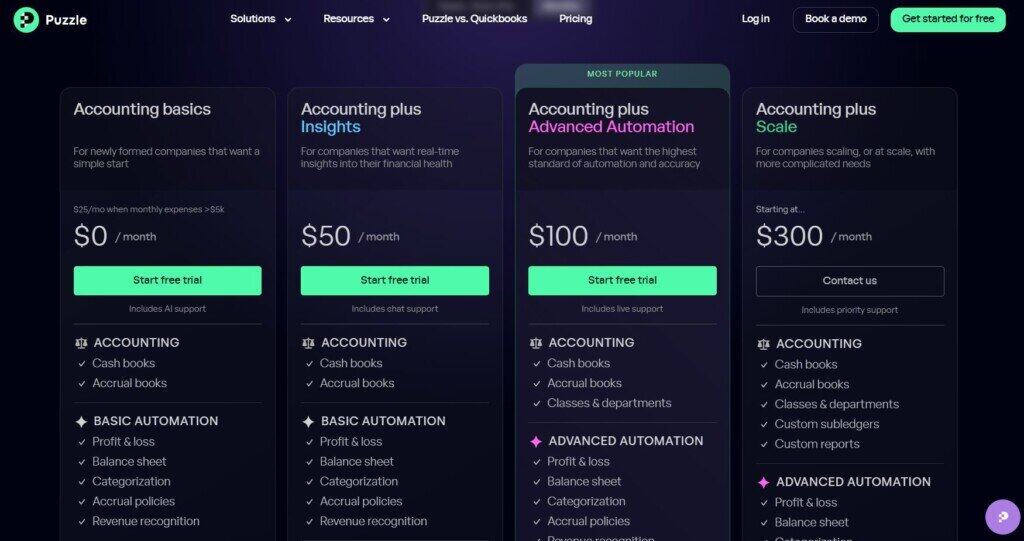
- Pilot’s pricing is subscription-based, with tiers that depend on transaction volume and service level. At higher levels, you can add services like CFO support or tax preparation. For some companies, the appeal is that you can write one monthly check and know your bookkeeping is handled. The tradeoff is that the cost can escalate quickly as you grow.
- Puzzle.io’s pricing is software-driven and you pay by what your company needs – there are three tiers to choose from in terms of pricing, and they’re all relatively affordable. Since it automates much of the work Pilot assigns to humans, the marginal cost of adding more transactions or complexity tends to be lower.
In plain terms:
- Pilot = predictable service fee, but rising costs with growth.
- Puzzle.io = scalable system, often more cost-effective long term.
As a CPA, I tend to prefer models where technology does the heavy lifting. It means fewer bottlenecks and less exposure to human error, while keeping expenses aligned with actual business growth.
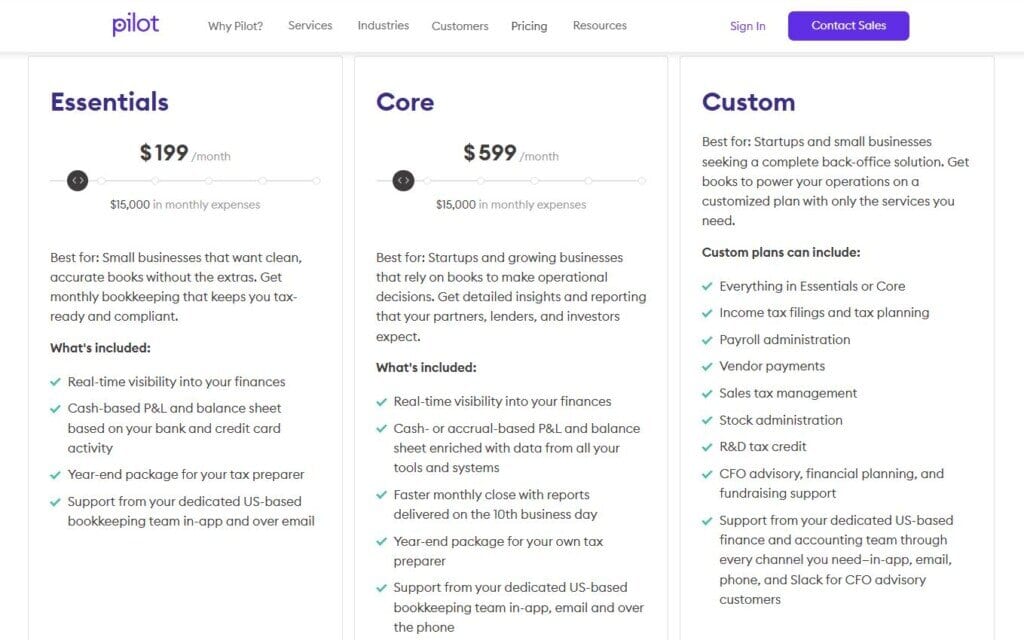
Reporting and Visibility
Here’s where the contrast sharpens.
Pilot provides financial statements prepared on a monthly cadence. These are reliable, but they can feel like a black box. You’ll see a polished income statement, balance sheet, and cash flow statement. What you won’t always get is the ability to dig into the underlying detail in real time. If you need to answer an ad-hoc question, you may have to ask Pilot’s team, wait for a response, and hope the turnaround fits your timeline.
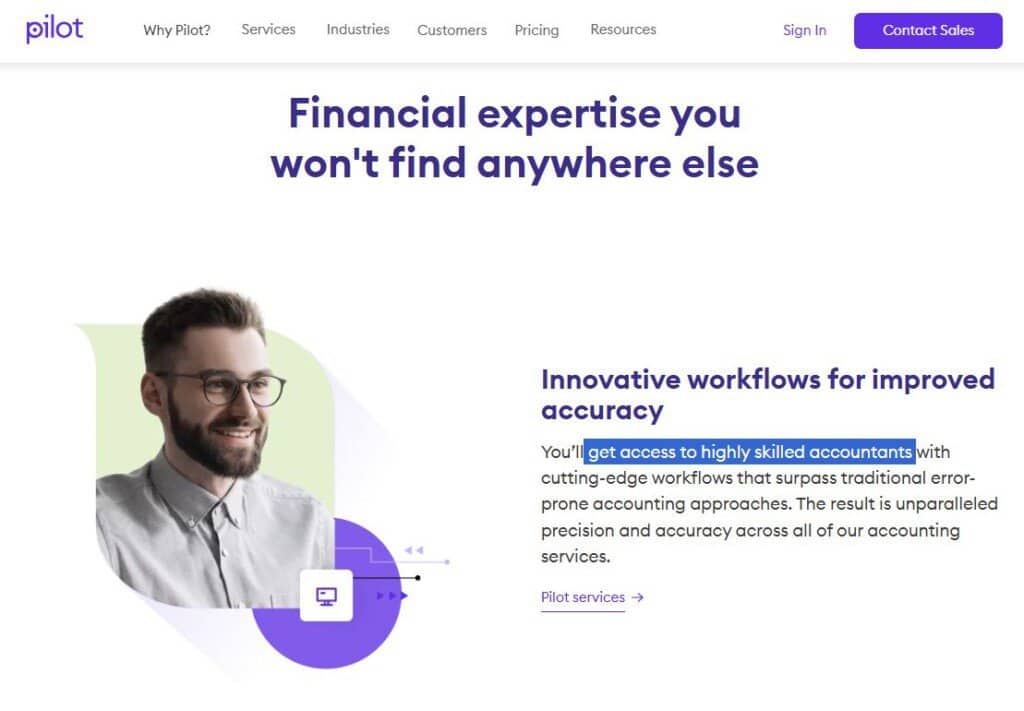
Puzzle.io, by design, is more open. It treats the books as a data platform rather than a static deliverable. That means you can:
- Drill down from a line item to the transaction that supports it.
- Filter results by department, project, or time frame without waiting for a custom report.
- Export data for modeling or share with auditors in a structured, consistent format.
This transparency is what finance professionals crave (keep in mind I’m biased as I like things NOW!). When I review Puzzle’s books, I can reconcile balances myself rather than taking a PDF at face value.
Integrations and Ecosystem Fit
Both Pilot and Puzzle.io integrate with the systems most startups already use: banks, credit cards, payroll, and payment processors. But the way they integrate shows their priorities.
- Pilot pulls data into its bookkeeping workflow. The integration is functional but limited. You see the cleaned results but the pipeline of raw data. That’s fine if your only goal is accurate financials, but it’s less helpful when you need to understand the mechanics of your cash flow.
- Puzzle treats integrations as core infrastructure. The system pulls data directly from financial institutions and syncs continuously. This means fewer manual adjustments, less lag time, and a much clearer picture of cash in and cash out.
In short:
- Pilot integrates enough to keep books tidy.
- Puzzle integrates deeply to keep data live and verifiable.
This difference matters most when companies scale. With growth comes more accounts, more tools, and more complexity. A platform that can handle that data at the system level tends to age better.
Audit Readiness and Compliance
Another area where I see divergence is in audit readiness.
Pilot provides clean financial statements, which works for most companies in their early stages. But when businesses approach a fundraising round, M&A transaction, or audit, you need more than clean numbers. You need a defensible audit trail, which is the ability to show where each number came from. With Pilot, that trail exists, but it often lives in the workpapers and reconciliations held by their team, not in your direct line of sight.
Puzzle builds the audit trail into the product itself. Every transaction links back to its source, with categorizations and adjustments logged in the platform. That means if an auditor (or investor) asks, “Why is this expense in R&D instead of G&A?” you can click through and show the evidence instantly.
Who Each Platform Suits Best
To keep this balanced, I think it’s fair to say that both Pilot and Puzzle.io have their place.
- Pilot fits companies that want to outsource finance almost entirely. If your priority is to stay focused on product or sales and you’re comfortable letting another team manage the books, Pilot provides peace of mind.
- Puzzle.io fits companies that want a durable financial system. If you care about speed, visibility, and audit-ready data and if you want your internal finance team or CPA to engage directly with the platform—Puzzle.io tends to be the better long-term investment.
Think of it this way:
- Pilot is like hiring a bookkeeping firm that happens to use software.
- Puzzle.io is like adopting accounting infrastructure that professionals can build on.
Long-Term Scalability
One of the first questions I ask small business owners is: Where do you see your business in three to five years? The answer matters because accounting needs change drastically as you grow.
- Pilot’s scalability: Pilot does scale in the sense that they can continue providing bookkeeping as your transaction volume grows. They even offer CFO services at higher tiers. But scaling with Pilot usually means paying more for more human hours. That can work, but it doesn’t always feel efficient. I’ve seen too many companies discover that their bookkeeping bill doubled simply because they closed a big sales quarter.
- Puzzle.io’s scalability: With Puzzle.io, the model is different. As transaction counts rise, the platform automates reconciliation and categorization. Growth doesn’t automatically mean you’re billed for more staff time.
Scalability, in my mind, isn’t just about whether the vendor can handle your growth. It’s whether they can do it without creating friction or skyrocketing costs. That’s an area where Puzzle.io clearly has the edge.
User Experience: Interface and Workflow
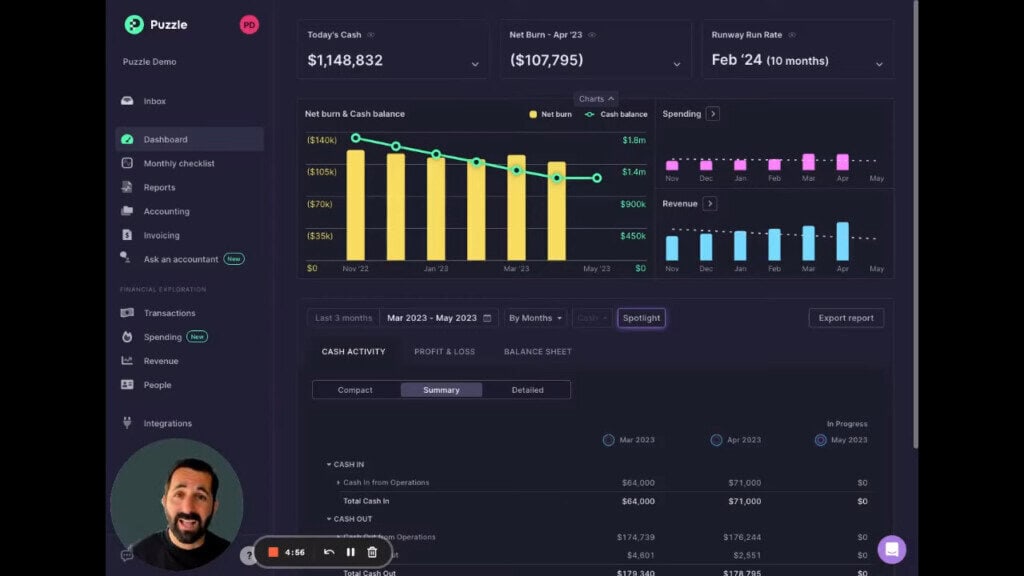
I’ll admit that accountants are notorious for tolerating clunky interfaces if the numbers are accurate. I like to joke that almost all accountants HATE change. And it’s true! But founders and operators care about usability, and this is an area where design makes a real difference.
- Pilot’s interface: The platform is service-first, software-second. The dashboard is clean but basic. Most of the experience revolves around receiving monthly reports and messaging with your Pilot finance team. It works, but it isn’t built for exploration.
- Puzzle’s interface: Puzzle looks and feels like modern SaaS. Dashboards update quickly, reports are interactive, and navigation feels intuitive. More importantly, it’s designed for exploration. If you want to see how expenses trend over time or drill into SaaS subscriptions by vendor, the platform makes that easy.
I’ve seen non-finance founders engage more with Puzzle.io simply because the interface invites it. And in my view, anything that encourages leaders to actually look at their numbers is a net positive.
Limitations and Tradeoffs
Neither platform is perfect. To keep this comparison fair, here are a few tradeoffs I’ve observed:
- Pilot limitations:
- Can feel like a black box—limited visibility into underlying transactions.
- Turnaround times can frustrate operators who need answers fast.
- Costs rise quickly as volume and complexity grow.
- Puzzle.io limitations:
- Because it emphasizes software, some very early-stage companies may still need outside help interpreting the data.
- Implementation requires a bit of setup—connecting accounts, verifying categorizations—before you see the full benefit.
- Human guidance isn’t as bundled-in, so you may still want an advisor or CPA to interpret results.
The Subtle Edge
After years in accounting, I’ve learned that no tool is perfect. Founders need to choose based on their goals and tolerance for involvement. But when I weigh service vs. system, black-box reporting vs. transparency, and manual processes vs. built-in automation, I see Puzzle edging ahead.
It’s not a knockout win because Pilot has its merits and can be a lifesaver for companies with no interest in building an internal finance function. But for businesses that care about clarity, scalability, and control, Puzzle is the platform I’d bet on.
The Bottom Line
At the end of the day, Pilot and Puzzle.io represent two different philosophies about accounting in the startup era:
- Pilot says: don’t worry about the books, let us handle them for you.
- Puzzle.io says: your books should be a living system that anyone on your team can understand and explore.
If you’re management who wants to stay entirely hands-off, Pilot may feel more comfortable. But in my professional judgment, most companies reach a point where visibility, transparency, and scalability matter more than convenience. And that’s where Puzzle.io pulls ahead.
As a CPA, I tend to recommend tools that build lasting financial infrastructure. Numbers aren’t just compliance documents, they’re the lens through which businesses make decisions. Puzzle, in my view, does a better job of turning accounting data into a decision-making platform.

